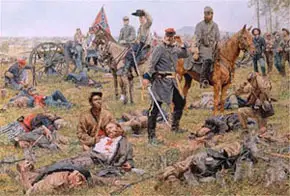Civil War Battles |
Colonial Wars |
American Wars |
Link To This Page — Contact Us —
The Battle of Kernstown (First)
March 23, 1862 in Kernstown, Virginia
 |
|||||||||||||||||||||
|
Acting on faulty intelligence from Col. Turner Ashby that suggested that his small army outnumbered the Union forces at Winchester, Maj. Gen. Thomas J. "Stonewall" Jackson moved to strike his opponents and prevent Union reinforcements from leaving the Valley to aid McClellan's army on the Peninsula. The division of Brig. Gen. James Shields in fact outnumbered Jackson more than 2-to-1.
On March 21, Jackson was moving down the Valley to cover Gen. Joseph E. Johnston’s flank as Johnston fell back from Centreville. He got news that the Union force was splitting, half marching east over the Blue Ridge Mountains and the other was pulling back to guard the upper Shenandoah. On March 22, relying on faulty intelligence that reported the Union garrison at Winchester numbered only about 3,000, Jackson turned his men around and moved 25 miles, and another 15 miles by 2:00 P.M. the next day.
On March 23, the main body of Confederate infantry, depleted by heavy straggling in the hard marches, faced what seemed a rearguard, only 4 regiments. Rather than waiting for more scouting or for more of the stragglers to catch up, Jackson hurled his tired men into an attack. They got nowhere.
Instead of just a rearguard it was the whole Union force, an infantry division over twice Jackson’s strength. The 8,500 Federals, commanded by Col. Nathan Kimball, easily repulsed Jackson at Kernstown, despite Jackson’s efforts to rally men and impel them forward. Kimball then counterattacked Jackson's left flank and forced him to retreat. However, the Union orders were quite cautious, and after a tactical counterattack that turned Jackson’s flank there was no pursuit that might have scattered the Confederate force.
Despite the Union victory, President Abraham Lincoln was disturbed by Jackson's threat to Washington and redirected substantial reinforcements to the Valley, depriving McClellan's army of these troops. McClellan claimed that the additional troops would have enabled him to take Richmond during his Peninsula Campaign.
